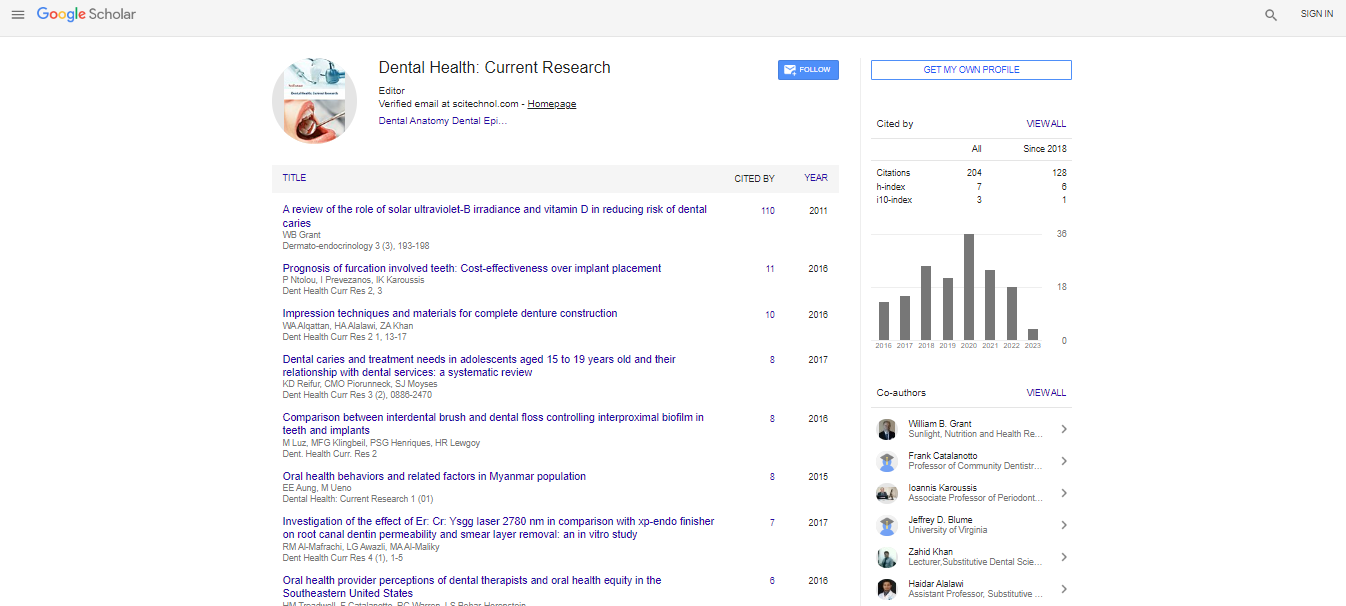Perspective, Dent Health Curr Res Vol: 9 Issue: 4
Relationship between Anxiety and Dental Health
Santosh Prakash*
1Department of Periodontology & Oral Implantology, Rajendra Institute of Medical Sciences, Ranchi, India
*Corresponding Author: Santosh Prakash,
Department of Periodontology &
Oral Implantology, Rajendra Institute of Medical Sciences, Ranchi, India
E-mail: santosh.p@gmail.com
Received date: 01 August, 2023, Manuscript No. DHCR-23-113114;
Editor assigned date: 03 August, 2023, PreQC No. DHCR-23-113114 (PQ);
Reviewed date: 17 August, QC No. DHCR-23-113114;
Revised date: 24 August, 2023, Manuscript No. DHCR-23-113114 (R);
Published date: 31 August, 2023, DOI: 10.4172/2470-0886.1000175
Citation: Prakash S (2023) Relationship between Anxiety and Dental Health. Dent Health Curr Res 9:4.
Description
The link between mental health and physical well-being is a topic of growing interest and research. One intriguing facet of this connection is the relationship between anxiety and dental health. Anxiety, a prevalent mental health issue, has far-reaching implications that extend beyond the mind, affecting various aspects of the body, including oral health. In this article, we will explore the intricate interplay between anxiety and dental health, shedding light on how psychological stressors can manifest as oral health issues. By examining this connection, we can gain a deeper understanding of the importance of holistic health and the necessity of addressing both mental and dental well-being for a comprehensive approach to overall health and wellness.
Effects of stress on dental health
Bruxism (Teeth grinding): Stress can lead to bruxism, a condition where one can clench or grind the teeth, often unconsciously, especially during sleep. This habit can cause tooth enamel erosion, fractures, and even jaw pain. A mouthguard prescribed by dentist can help protect the teeth from the damaging effects of bruxism.
Gum disease and stress: Stress can weaken immune system, making more susceptible to infections, including gum disease. Chronic stress can lead to increased inflammation in the body, which can exacerbate gingivitis or periodontitis. Practicing stress management techniques like relaxation exercises and meditation can help reduce the risk of gum disease.
Canker sores and stress: Canker sores, painful ulcers that develop inside the mouth, can be triggered or worsened by stress. While they typically heal on their own, managing stress can help prevent their recurrence. Stress reduction techniques, like deep breathing and yoga, may be beneficial.
Neglecting oral hygiene: During stressful periods, people may neglect their oral hygiene routines, skipping brushing and flossing or consuming unhealthy comfort foods. This can lead to an increased risk of cavities and gum disease. It's important to maintain a consistent oral hygiene routine, even during stressful times.
Dry mouth and stress: Stress can lead to a dry mouth by affecting saliva production. Saliva helps rinse away food particles and neutralize acids, protecting the teeth from decay. To combat dry mouth, stay hydrated and consider using sugar-free lozenges or mouthwashes to stimulate saliva flow.
Stress management for oral health: To mitigate the impact of stress on dental health, it's essential to practice stress management techniques. These may include exercise, deep breathing exercises, meditation, mindfulness, and seeking support from a therapist or counselor when needed. By managing stress effectively, one can protect oral health and overall well-being.
Conclusion
The relationship between anxiety and dental health is intricate and often overlooked. The physical manifestations of anxiety, such as teeth grinding and neglecting oral hygiene, can have a detrimental impact on one's teeth and gums. However, by understanding this connection and taking proactive steps to manage anxiety and prioritize oral health, individuals can break the cycle and maintain a healthy smile.
Remember that seeking professional help, both for anxiety and dental care, is essential. Dentists and mental health professionals can work together to provide comprehensive care that addresses both the psychological and oral health aspects of anxiety. By taking these steps, individuals can improve their overall well-being and ensure a radiant smile for years to come.
 Spanish
Spanish  Chinese
Chinese  Russian
Russian  German
German  French
French  Japanese
Japanese  Portuguese
Portuguese  Hindi
Hindi 